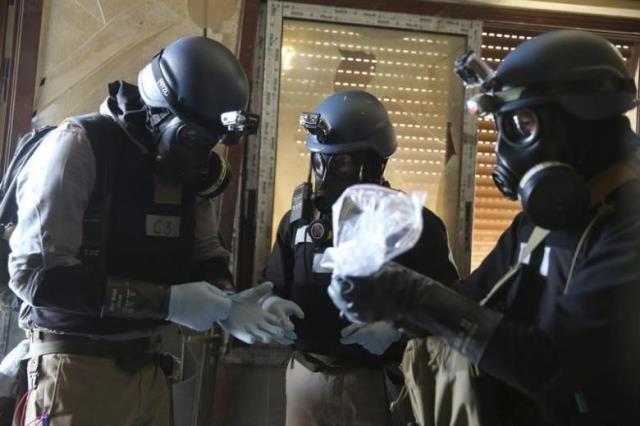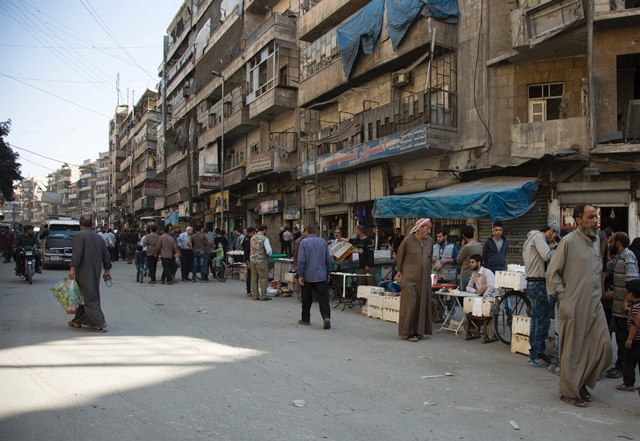
"We believe that the proof is not there for any punitive action to be taken. It's simply not there," Russian Ambassador Vitaly Churkin told reporters following a closed-door Security Council meeting. A joint United Nations-Organization for the Prohibition of Chemical Weapons (OPCW) panel concluded that government forces carried out three chlorine gas attacks on villages in 2014 and 2015.
Suicide attack on Syria wedding kills 32
It was the first time an international probe blamed President Bashar al-Assad's forces after years of denial from Damascus. But Churkin told the council that the findings were not strong enough to trigger sanctions. The conclusions "in most cases... are not substantiated by sufficient testimonial basis, first of all material proof, they are full of contradictions and therefore unconvincing," he said, according of a text of his remarks.
The findings are "not definitive, have no legally binding force and cannot serve as accusatory conclusions for taking legal decisions," he added. Britain and France pressed demands for sanctions, arguing that UN resolutions provided for such action in response to the use of chemical weapons.
 Syrian residents of the rebel-held side of the northern city of Aleppo shop on a street on October 27, 2016. Regime forces backed by ally Russia have waged an aerial and ground assault since late September to recapture eastern Aleppo, killing hundreds of civilians and destroying infrastructure including hospitals. PHOTO: AFP
Syrian residents of the rebel-held side of the northern city of Aleppo shop on a street on October 27, 2016. Regime forces backed by ally Russia have waged an aerial and ground assault since late September to recapture eastern Aleppo, killing hundreds of civilians and destroying infrastructure including hospitals. PHOTO: AFP"Those responsible for using chemical weapons must be sanctioned. There is no other way," French Ambassador Francois Delattre told reporters.
"There should be accountability for every single person involved in any use of chemical weapons in Syria or indeed anywhere else," British Ambassador Matthew Rycroft said. Government helicopters flying from two regime-controlled air bases dropped chlorine barrel-bombs on the villages of Qmenas, Talmenes and Sarmin, in rebel-held Idlib province, the panel's latest report said.
Chlorine use as a weapon is banned under the Chemical Weapons Convention, which Syria joined in 2013 under pressure from Russia, Assad's ally. Although previous OPCW reports concluded that toxic gases were used as weapons in Syria's five-year war, they stopped short of identifying the perpetrators.
The panel identified the 253 and 255 squadrons of the 63rd helicopter brigade, which flew from the Hama and Humaymim air bases, and the 628 squadron based in Humaymim as the perpetrators. The UN-OPCW panel also found that the Islamic State group used mustard gas as a weapon in August 2015.
Turkey fears Russia-US war over Syria
"We stand firmly behind the report and its conclusions," Virginia Gamba, who led the investigative panel, told reporters.
Russia also rejected a US proposal to extend the panel's mandate -- which ends on Monday -- for a year, arguing that more time is needed to discuss the experts' future work. The probe should be broadened to look at chemical weapons use by extremist groups and in neighboring Iraq, Churkin said.
The Security Council set up the so-called joint investigative mechanism (JIM) in August 2015 to determine who was behind the chemical attacks.






1732445375-0/Untitled-design-(9)1732445375-0-270x192.webp)


1732428810-0/Copy-of-Untitled-(3)1732428810-0-270x192.webp)
1732425487-0/BeFunk_§_]__-(42)1732425487-0.jpg)






COMMENTS
Comments are moderated and generally will be posted if they are on-topic and not abusive.
For more information, please see our Comments FAQ